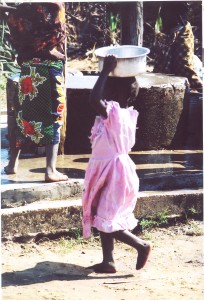by
Mwizenge S. Tembo, Ph. D.
Professor of Sociology.
In September 2012 just a few weeks after my book “Satisfying Zambian Hunger for Culture” was published, I was a guest on Mr. James Mwape’s Blog Radio to discuss some aspects of Zambian culture. A Zambian man called and said he was married to a non-Zambian woman and lived in New York City. They decided to go and visit his Zambian parents who lived in the City of Mufulira on the Copper belt. The couple stayed at his parents’ house. The second day they were there, the non-Zambian wife decided to wear some very tight shorts and a tight top that may have revealed probably too much in the context of the in-laws’s household. The Zambian’s father and mother were embarrassed and uneasy. When the Zambian husband asked his wife to wear something a little different may be more modest may be with a chitenje, her reply was that it was too hot and she had the right to wear what she pleased. Of course all of this broke many Zambian traditional customs including obviously the crucial “kuopa” custom that is practiced between in-laws.
On the same program, a Zambian woman called who was married to another non-Zambian. She complained that when she behaved like a daughter-in-law would towards her father in-law according to Zambian customs by say, staying out of the living room where her father-in-law was sitting, the husband’s family complained that the Zambian wife had an unfriendly “attitude” wondering why she was always subdued and walking out of the living room when her father-in-law was there.
Although these two stories might look like the author is singling out foreigners or non-Zambians, this can actually happen to any individuals and sometimes even among Zambians in Zambia and abroad depending on their social upbringing. There is a famous song by Nashil Pitchen “Apongozi Amasiku Ano” in which he laments that the younger husbands in the cities in Zambia are so disrespectful these days. https://www.youtube.com/watch?v=JnQwhvY4_3o
They walk into their mother-in-law’s house without knocking. Supposing the mother in-law is taking a nap, says Nashil Pitchen, on the living room couch and her covers accidentally fall off in her sleep and she is partially naked, that would be very disrespectful and embarrassing.
Everyone knows that we are experiencing tremendous social change as Zambians. But some of our customs need to be understood better so that we can know how to behave better within our families while following some of the very positive Zambian customs. These customs traditionally exist in virtually all of the 72 tribes in Zambia including among the Lozi, Tumbuka, Ngoni, Chewa, Tonga, Kaonde, Luvale, Bemba, Lunda, Chokwe, and many others.
You are lucky if you are a Zambian and married to a non-Zambian who might be aware and has enough humility when you visit back in Zambia or even when abroad, that the family and kinship customs are important enough for the individual to try their best to practice them.
These video clips from my recent lecture at the Virginia Mennonite Retirement Center Lyceum Series in Virginia in the United States, explain three important Zambian customs: Kuopa or “to fear”, https://www.youtube.com/watch?v=YNRPnmd7iVE
Kulanga or disciplining and giving guidance to children, https://www.youtube.com/watch?v=NHz_bMRl2Rc
and kusungana https://www.youtube.com/watch?v=mIzt5PwafJY
which expresses the deepest love between a married man and a woman. These are good customs that reflect being civilized. They are neither primitive nor backward. I make this argument in my lecture. Please send the clips to anyone; your children, friends, even people in Zambia and people who need to know these customs. I am sure that ZNBC radio can probably use the video clips. Please forward the clips to them if you get a chance.
